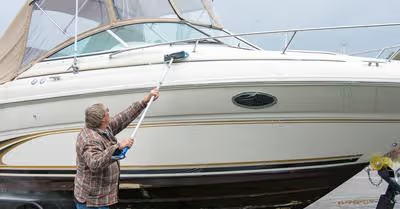
Key Takeaways
- The best time to clean your boat is at the beginning of your boating season.
- Always select effective cleaning products for different types of stains and grime.
- Different weather conditions significantly affect your boat cleaning schedule.
Don't waste time and effort cleaning your boat at the wrong moments. Learn the optimal cleaning schedule that guarantees a sparkling vessel every time.
The best time to clean your boat is typically at the beginning and end of each boating season and after any extended periods of use or storage. Giving your boat a thorough cleaning helps to remove any built-up dirt that might have accumulated on the hull and other essential parts.
As an expert in boat care and maintenance, I know that adhering to a cleaning schedule is crucial in prolonging the life of your boat and its various components. As such, I’ll provide a comprehensive guide on the best schedule to clean your boat and ways of keeping your boat in tip-top shape and ready for your next adventure.
Best Time for Cleaning Your Boat
Boat cleaning is essential to boat maintenance and ensuring that your vessel remains in top shape. But what is the best time to clean your vessel? The answer to this question may vary.
However, the best time to clean a boat is at the beginning of the boating season, as it prepares your it for the upcoming boating season. Additionally, spring is a great time to inspect your boat for any potential issues that need to be addressed before heading out on the water.
Cleaning Techniques and Equipment
Cleaning your boat is essential for maintaining its appearance and protecting it from damage due to dirt, grime, and saltwater buildup. The right methods and tools can make all the difference in a successful and efficient cleaning process.
Here are some techniques and equipment you should use when cleaning your boat.
Cleaning the Hull
The boat’s hull takes the brunt of the water, salt, and marine debris, so it's crucial to clean it thoroughly. Start by rinsing the hull with fresh water to remove salt and loose particles.
You should use a soft bristle brush that won't scratch fiberglass surfaces and a specialized boat cleaning solution to scrub away all the grime. Rinse well to avoid water spots, and let the hull dry before applying any wax or protectant.
Additionally, pay extra attention to the running gear (propellers, rudders, shafts, etc.), as cleaning these areas can improve performance and prevent problems from arising.
Cleaning the Deck
The deck is constantly exposed to the elements and foot traffic, making it prone to dirt, stains, and wear. Here's how to keep it in good condition:
- Rinse the deck thoroughly with fresh water to remove salt and debris.
- Use a soft brush and boat-specific cleaner to scrub the surface, going with the grain if you have a teak deck.
- Rinse again with plenty of water to prevent water spots and streaks.
- Allow the deck to dry before applying any sealants or waxes for added protection.
Cleaning the Interior
Boat interiors can accumulate dirt, mold, and stains, so keeping surfaces clean and dry is essential to maintaining a pleasant and healthy environment. To clean the interior:
- Vacuum any loose dirt and debris from carpets, cushions, and other fabric surfaces.
- Wipe down all hard surfaces, such as fiberglass and upholstery, with a mild cleaner designed for boat interiors.
- For stubborn stains, gently scrub affected areas with a soft bristle brush.
- Air out the cabins and allow all surfaces to dry fully to prevent mold and mildew.
Protecting Your Boat from Damage
As boat owners, keeping your vessels clean and maintained is crucial to ensure their longevity and value. Prolonged exposure to harsh elements can cause irreversible damage, and neglecting to clean your boat can permanently stain and deteriorate boat windows and other parts.
Now, let’s discuss the importance of caring for fiberglass and painted surfaces and maintaining outboard motors and metal components to protect your boat from damage.
Caring for Fiberglass and Painted Surfaces
Fiberglass and painted surfaces require special attention to maintain their luster and prevent damage. Here are a few tips to care for these areas:
Regularly wash your boat using a mild detergent mixed with water. Avoid using harsh chemicals that could harm the gel coat or paint. Remember to rinse it thoroughly afterward.
Also, apply a protective wax or polish at least twice a year. This will create a barrier against UV rays, oxidation, and other environmental pollutants that could harm your boat's surface.
During winter months, it's essential to use a proper boat cover to shield your boat from harsh weather conditions. This will also help to protect the fiberglass and painted surfaces from potential damage.
Maintaining Outboard Motors and Metal Components
Outboard motors and metal components are other critical areas to maintain, as they are often exposed to harsh environments and are subject to corrosion. Follow these tips to protect them:
After each use, flush the outboard motor with fresh water to remove any salt, dirt, or debris. This practice will help prevent corrosion and engine wear.
Also, regularly inspect the sacrificial anodes on your outboard motor, and replace them as needed. These anodes are designed to corrode, protecting your engine and metal components against galvanic corrosion.
After cleaning, store your boat in a dry, sheltered area when not in use, and cover cushions and other fabric components to protect them from wear and mildew.
Boat Storage and Maintenance
Boating brings joy and a sense of adventure to all who experience it, especially if you have a well-maintained and clean boat. Thus, it’s crucial to understand the best practices for maintaining and storing your vessel to prolong its life and ensure safe operation.
In addition, boat maintenance prevents the spread of aquatic organisms that may damage your vessel.
Let’s explore the opportunities and challenges of various boat storage options and discuss the fundamental aspects of boat maintenance.
Dry Storage vs. Wet Slip
There are two primary options when storing your boat: dry storage and wet slip. Dry storage refers to keeping the boat out of the water, typically in a warehouse or a trailer in a designated boat storage facility.
On the other hand, wet slip storage is when you dock your boats at a marina after slow rides.
To help you better understand the differences between these two options, we’ve created the following table:
Covered vs. Uncovered Slip
In addition to choosing between dry storage and wet slip, you must also decide whether your boat will be stored in a covered or uncovered slip at a marina. A covered slip protects your boat from harsh elements, while an uncovered slip leaves your vessel exposed to the elements.
Some considerations when choosing between a covered and uncovered slip include:
Covered Slip
- Offers protection from sun, rain, snow, and wind
- Reduces the need for constant cleaning and maintenance
- It may cost more than an uncovered slip
Uncovered Slip
- Less expensive than a covered slip
- The boat is exposed to the elements, potentially leading to increased wear and tear
- Requires more frequent washing and maintenance
How Weather Conditions Affect Your Boat's Cleaning Schedule
When it comes to taking care of your boat, weather conditions play a crucial role. Exposure to saltwater, sunlight, and other environmental factors can affect how often you need to clean your boat.
Saltwater Exposure
If you own a boat that spends most of its time in saltwater, you'll need to clean it more frequently than a boat that's used in freshwater. This helps prevent saltwater damage.
Notably, salt water can cause corrosion and damage to your boat's exterior, so it's important to rinse your boat with fresh water after every use.
Sunlight Exposure
Exposure to sunlight can cause your boat's paint and gelcoat to fade over time. To prevent this, it's important to keep your boat covered when it's not in use.
You can use UV-resistant wax or polish to protect your boat's exterior if you don't have a cover.
Other Environmental Factors
In addition to saltwater and sunlight, other environmental factors can affect your boat's cleaning schedule. For example, if you live in an area with high humidity, you may need to keep your boat clean to prevent mold and mildew growth.
If you store your boat in a marina, you may need to clean it more often to remove bird droppings and other debris.










